Street Food collectives across the UK bring together groups of businesses and provide a platform for many of our members to trade through regular events, markets and across bricks & mortar sites such as market halls. In this article we hear from the people behind some of these collectives and find out how they are getting through the toughest year the hospitality sector has faced.
KERB is split into 3 key areas. With the events side of the business being a key revenue driver, between the first lockdown and now, they have barely catered an event – that’s 17 months of no business and over £3m lost. KERB’s CEO Simon Mitchell told us “the market hall lost money month on month and the business had to take on significant borrowing to get through.”
Canteen in Leicester were unable to access any funding and subsequently lost all of their events, despite the majority of them being on Local Authority sites and many being council-organised.
foodPark in Cambridge had changed ownership in October 2019. With Becca from Off The Beaten Truck taking the helm, there were growth plans in place for 2020 – but then along came Coronavirus. They went from 5 markets to being off the road for the first 12 weeks, facing uncertainty and feeling unable to get things off the ground.
Digbeth Dining Club in Birmingham stopped trading. Their main concern was the impact this would have on the business owners who they work with – DDC’s co-owner, Jack Brabant expressed to us that he felt “Utterly devastated” when the pandemic took hold of the industry.
The common threads within the discussions had with these collectives is community and change; how collectives support their communities of traders and, rapid change; adapting to the ever-changing situation. This is, however, easier said than done.

Community.
To KERB, their trader community is key. Their community message board is regularly updated and information on Government schemes has been passed on to their traders. Along with general support, KERB’s trader directory enabled the collective to shout about their traders even when KERB wasn’t able to operate – information on where customers could get their food was shared and trader takeovers happened across their channels. They have been trying to navigate market space and were supposed to open at Kew Gardens in December but last minute lockdown restrictions and changing rules around on the sale of alcohol made it difficult. It was in short “ridiculous trying to navigate that time.”
Becca from foodPark talks about their traders with an overwhelming sense of pride and achievement – “The strength of being a collective is that we can spur each other on, sharing advice and Covid-19 has proven that we are a really strong team.” In spite of the pandemic, they have continued, like KERB, to support their community – helping out with DIY Kits, food deliveries and shouting about what each business was doing whilst finding a long-term way of working for the collective.
Ahmed from Canteen said that “over the year it completely decimated them and their traders.” “They had street food traders going to work for other people; Amazon, Covid-19 testing sites – any jobs they could get really.” He was on the other end of the phone to support and give advice whenever he was needed and each time reiterated that they should “do whatever you need to do – a job is a job – regardless of what it is.” A lot of Canteen’s traders haven’t come back yet and what was overwhelmingly disappointing for Ahmed was the lack of support from his local authority, especially when he had worked with them on events for so long.
DDC told us that many of their traders had invested for the new season, others were start-ups, self-employed. He explained that “if there was a way for them to miss government support, they managed it. Not that we fared much better in terms of support, but we got some. Our initial priority was to keep our customers in business or there would be no DDC.”
The platform that these collectives provide for their traders and the support their teams were able to give was key. They were – and are still trying to – save their own businesses as well as the businesses that make them what they have become; established, authentic street food & hospitality brands in their own rights. The sense of community and the help businesses could give each other across all groups of traders really is what kept people going and it is this collective mindset that enabled them to create solutions and find a way through.
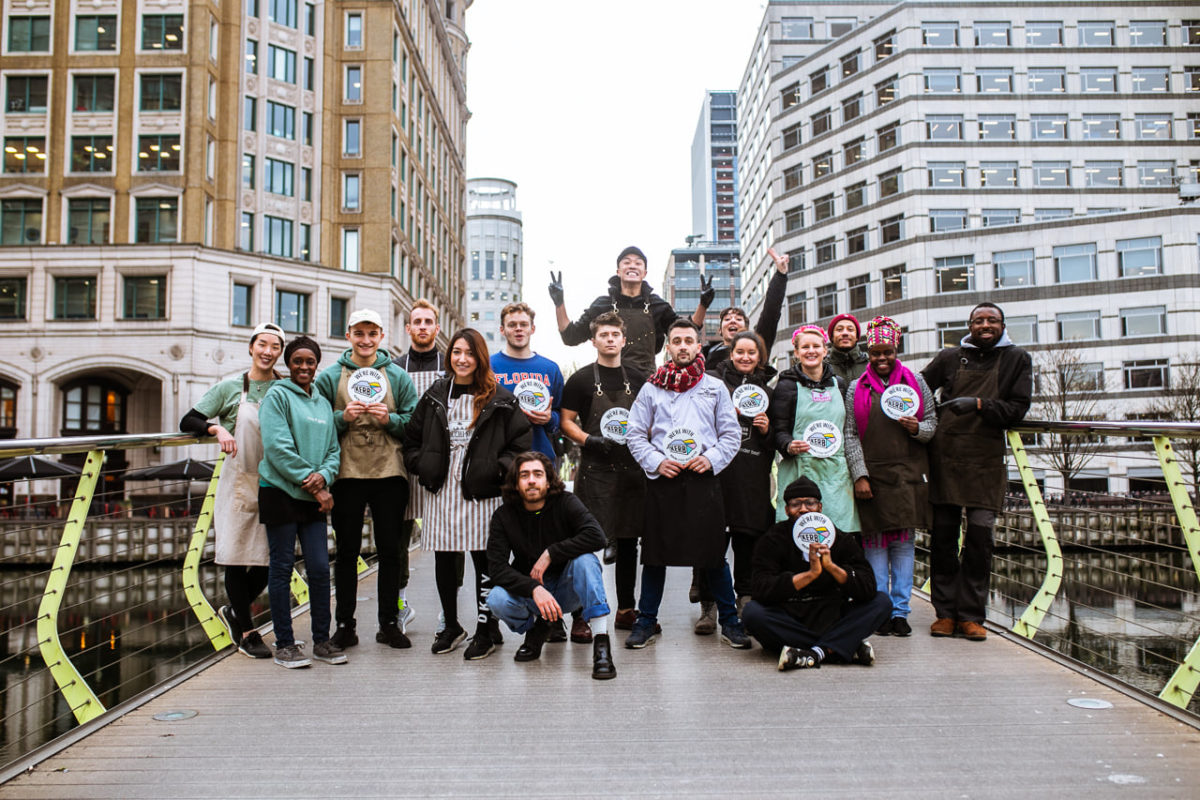
Image – KERB
The change.
Whilst the Covid-19 restrictions came in and changed again and again, adapting to this in a way that was sustainable was and still is the priority. The challenges around Government support coupled with the need to keep the sector afloat meant that new ways of working had to be established.
For foodPark, this would be a long-term change. They worked with a local developer who used to come to their markets and created an online system for customers to pre-order, choose food, make payment & select a collection time to come and pick up their order. Consequently, there was no queuing, which made their landlords happy. This was good for the customer as it was the safest way to pick up food, there was minimal food waste, and often traders would arrive onsite having sold out. Covid forced them into creating this system and they have gained new sites to trade from through its use.
The focus for Simon and his team was trying to create opportunities. The “Big Pivot” for them was getting access to Stadia across the country through a deal with Compass Group. The event pilot research is taking place and results should be out by the end of May (see the NCASS website for updates). The hope is that this part of the sector will bounce back soon, enabling profitable trading again for many businesses.
At the time of writing this article, we’ve reached the 17th of May milestone for indoor re-opening across England and KERB have been looking for more local market space, ready for a June launch. Seven Dials (home to KERB’s market hall) will be open and in late June/July they’ll be trading across football stadiums and The Oval. Things are looking more positive for September onwards for KERB.
DDC were in regular discussions with NCASS in the weeks leading up to the lockdown as were other street food partners. They’d been sent something called the Milan Protocol which showed how food was delivered safely in Milan when everyone was confined to their homes. Jack told us about their eureka moment “one day during a conversation with Mark where we were discussing how can you have a takeaway that you can’t take away from – the penny just dropped and we all said drive-through at the same time.”
A few weeks later DDC Click & Collect launched, and they were able to offer 4 days trade to 5 businesses every week. They also supported some local producers and charities. When outside hospitality could open outdoors, they created giant beer gardens at Warwick castle and Coventry Cathedral, which is still running.
“Pretty much everyone I spoken to says, I’ve never worked so hard for so little money – and been so grateful for it. That was us really, and our caterers.”
Distancing and other measures make most hospitality and events unfeasible, so when they moved to click and collect, they were challenged with adopting tech for the first time, and then launching the new venue with full table service. That said, they currently have four sites open most weekends, with more to come.
Jack went on to say that “The pace of change and the uncertainty has been a real challenge but one we’ve coped with so far and we are quietly confident we’ll make a strong recovery this year.”
DDC also set up a charity during Covid to support local kids with free school meals that launched after they carried out trials at local schools “There’s a chance we may be asked to provide 10,000 meals a day to school kids – that will be a challenge.”
Ahmed and Canteen have been busier recently, working on consultancy and helping new street food traders and hospitality businesses keep covid compliant “lots of people who were home cooks, those who have been made redundant – we’re helping them free of charge and offering consultancy for street food traders, bars, restaurants etc. who want to open up safely.”
Ahmed went on to reiterate that covid compliance is key here if we want our sector to stay open –
“everyone is aware of the fragility of the situation, we’re a couple of months behind other countries – just making them aware that if you’re all working compliantly then you will be able to trade… lots of people didn’t know they could get a pavement licence or that they could take up other spaces, they weren’t aware that they could have outdoor spaces for their businesses, so the work we’ve been doing with NCASS has been invaluable in that respect – making sure people know what they can and can’t do and what is in place to support this.”
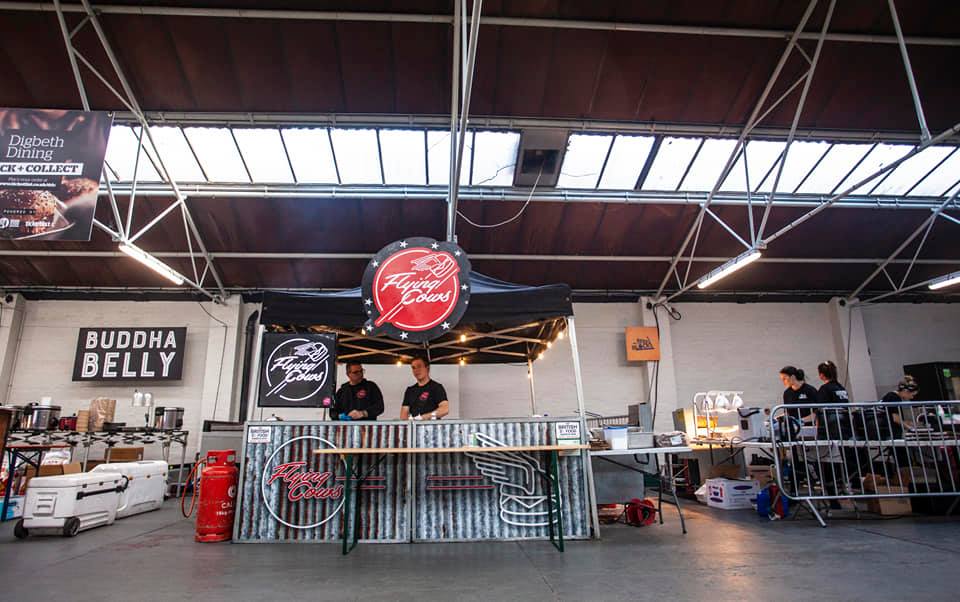
Image – Digbeth Dining Club
The payoff.
The lengths to which collectives have gone in order to adapt and secure a future have been immense, however, we know that many businesses have not been able to carry on trading. KERB had 90 traders before the pandemic and now have 40-50 at best. Simon explained further saying that “it has been so hard on independent businesses who have fallen through the gaps. What will happen is there will be new entrants to the market and we’re expecting an influx of new businesses.”
DDC tell a similar story – “We’ve lost 20% of the businesses we worked with who left the sector during covid. We have to replace them, but we also have more sites and more trading spaces than ever.
The important thing for me is that the quality and the authenticity are both there. At DDC the customers expect us to curate their food for them. We’re looking to work with NCASS and the Street Food Alliance to develop talent by mentoring and incubating new and existing businesses. Watch out for more on that soon.”
We’ve heard this echoed across the country and although there have been enormous challenges to overcome, there is an end in sight and with this ending, and at the risk of sounding very cheesy, there are new beginnings and there is growth that will follow.
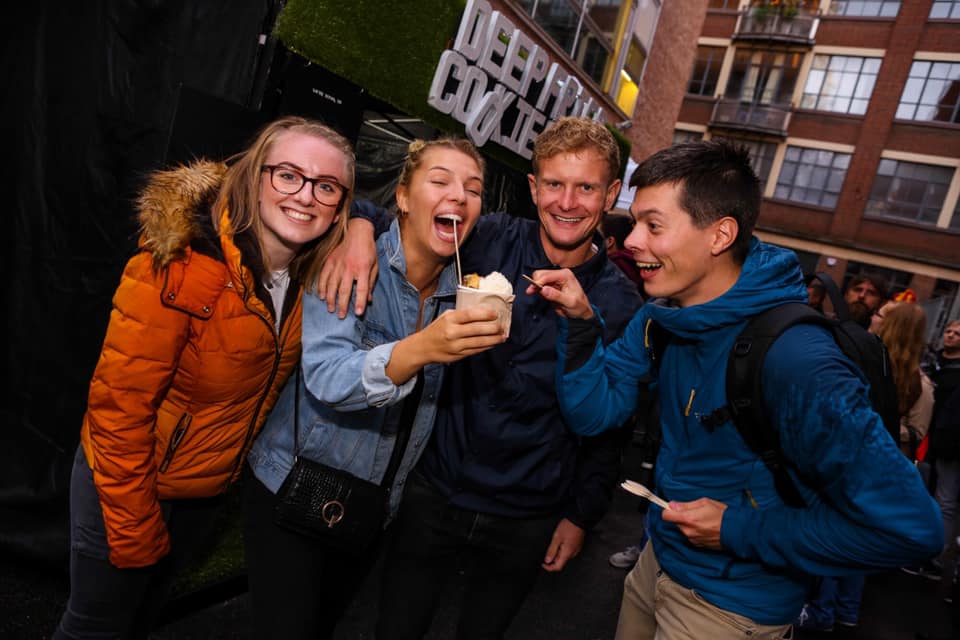
Image – Canteen
The future.
For foodPark. the systems they integrated as a response to the pandemic will stay part of what they do “it’s a game-changer”, said Becca “it has expanded the reach of street food, getting people to understand why they are doing it and this will have a bigger pay off post covid. Working this way when get back to doing large-scale events will mean that traders will arrive having sold out, people won’t be having to queue for their food. It creates a hybrid experience where customers will get the street food experience as well as not having to wait.”
“The nature of mobile catering is that you can go anywhere and create something in a space that has nothing – it’s a really safe way of eating and a business model totally suits this way of eating (al fresco). They’re at the same locations every week – they know where they can go – there will always be a different line up of trucks. The Sector is growing, hospitality is going to replace retail on the high street – street food contributes to the social-economic life in any space and Cambridge is hugely supportive of local and independent businesses.”
When we asked Ahmed about the future, he said “we need to work together and be sharing opportunities, be willing to help anyone to help the sector, other organisers and traders should be working together – everyone is in the same boat and is suffering and we will suffer more if we don’t stick together as a street food team.”
This sense of supporting each other certainly was a common thread throughout and KERB have big plans for street food. They have made KERB Food a social enterprise so all money from this side of the business will be reinvested into projects like training and employment schemes to get people back into employment in hospitality. KERB are championing hospitality as a career and giving young people employment opportunities in our sector.
Jack from DDC felt that street food was headed “in the right direction. I think there is going to be a lot more of it, with the high streets failing and so many people out of work, especially from hospitality. A lot more opportunity and lots of new traders. But also, a lot of people who don’t know what they’re doing is a risk. It is the perfect time for the street food alliances who can demonstrate best practice and help nurture new food businesses and events as well as helping with national and local government.”
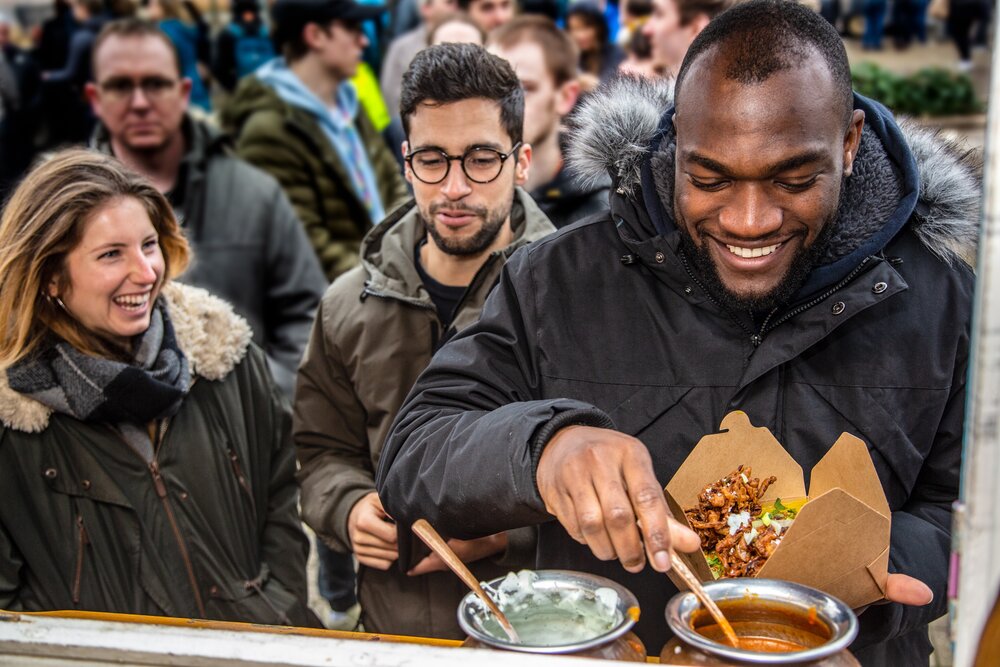
Image – foodPark
Words of wisdom
We asked what advice the collectives we talked to would give to traders now or if you’re starting up in street food and Jack pretty much sums it up here:
“Work on your product. Your recipes, your ingredients, how you present yourself and your food, branding and communications. If you haven’t started yet get some work experience with a few different businesses and speak to NCASS before you start spending money.
If you’re re-opening, I’d say speak to your local council about street trading if you don’t have anywhere to work. Contact your local alliance member to see if they have opportunities but understand what they’re looking for before you ask for a gig.
Street food events tend to curate the food and have established caterers working with them. Ask for advice and act on it. But don’t wait for DDC, KERB or Grub to let you in. We are good at finding the best traders – if you start smashing it, we’ll be only too keen to offer you work. We always secret shop prospective businesses to ensure they give great service to everyone, not just the people they want to impress.”
What is key to collectives is everyone working to a common goal, being part of something together and supporting each other in its growth & development and as Becca told us “your reach is so much larger when you work in or as a collective – being able to step back and seeing people enjoying it is why I do it, it gives me an enormous sense of fulfilment.”
Get in touch if you’d like to work with NCASS as a collective and find out more about the collectives we spoke to for this article here:
www.foodparkcam.com
www.digbethdiningclub.com
www.kerbfood.com
www.sevendialsmarket.com
www.canteenuk.net




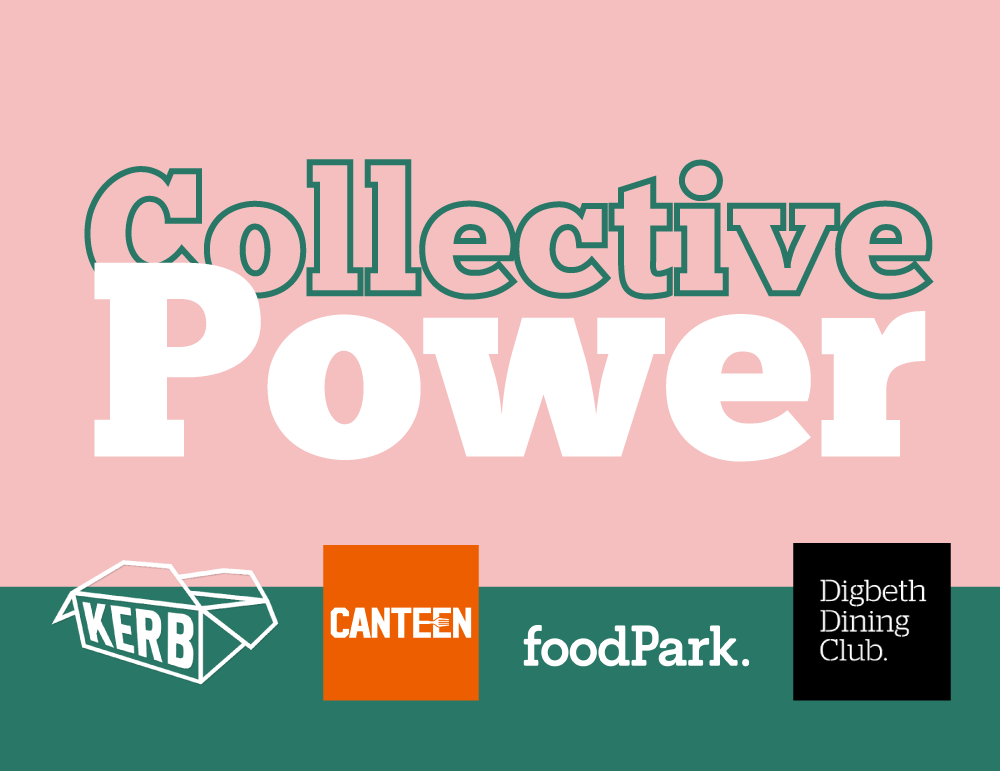
 Featured Training
Featured Training
OUR MEMBERSHIP
We're here to help make your catering business a success. Whether that be starting up or getting on top of your compliance and marketing. We're here to help you succeed.
Want our latest content?
Subscribe to our mailing list and get weekly insights, resources and articles for free
Get the emails